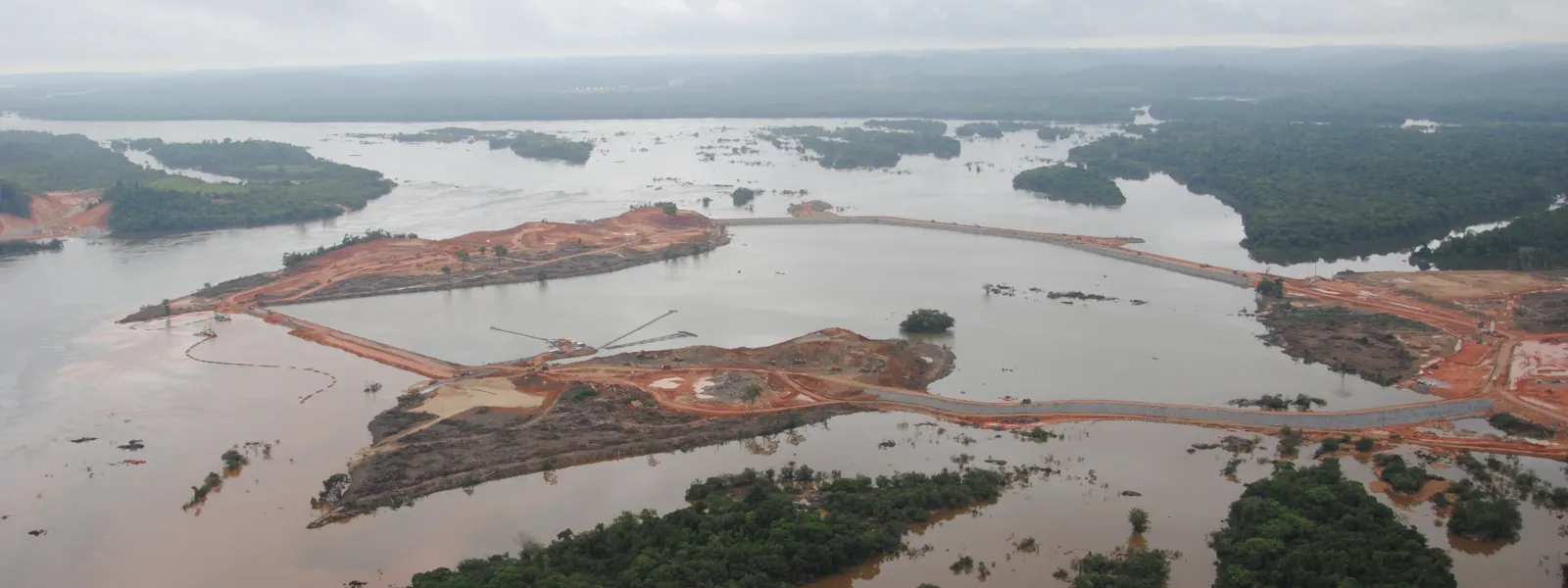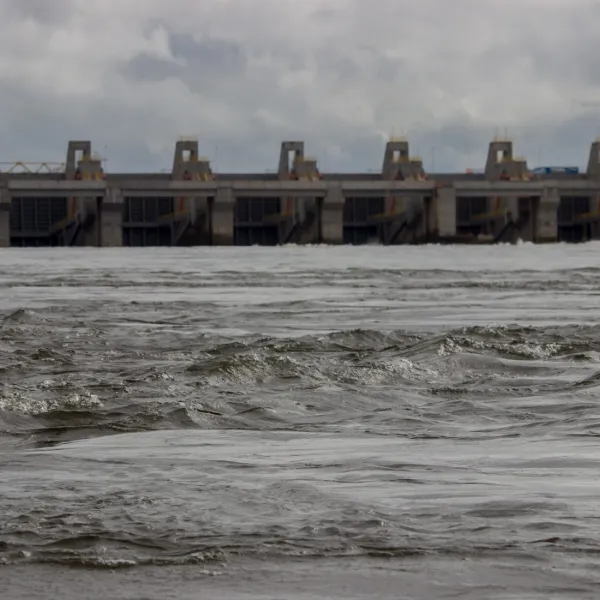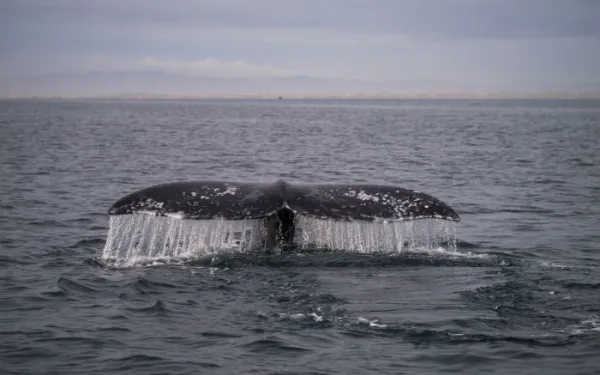
Project
Programa de Aceleração do CrescimentoHalting the implementation of large dams in the Americas
The more we learn, the clearer it becomes that large dams are unsustainable energy sources.
From the Mexican highlands to the Amazon River basin, hydroelectric mega-projects are aggravating climate change, destroying sensitive ecosystems, and threatening human rights and indigenous cultures.
In October 2016, a research study from Washington State University found that the world’s reservoirs generate 1.3 percent of all greenhouse gases (more than the total emissions of Canada!), confirming the damage dams do to our climate.
Large dams have no place on our rapidly changing planet. In a time of intensifying droughts, many vulnerable hydropower-dependent countries are facing energy shortages. And as extreme weather events increase around the world, the inherent danger of large dams becomes more evident.
Throughout the construction of Belo Monte, the world’s third largest dam, we’ve seen firsthand the grave impacts these projects have on the ecosystems in which they’re built. We’ve witnessed the violations they impose on the rights of indigenous and riverine communities, whose culture and livelihoods are tied so closely to the natural world.
Yet, across Latin America and the world, large dams are still being promoted as “clean and green” energy sources; and are even receiving support from national and international climate initiatives.
That support is part of the reason more than 3,700 large dams are currently being planned or constructed worldwide, more than 400 of which have been proposed for the vital Amazon River Basin.
At AIDA, we’re proud to be part of a team leading the fight against large dams across Latin America and beyond.
Partners:

Related projects

Mine Threatens a Great Marine Migrator
By Haydée Rodríguez Each year, the gray whale sets out on one of the longest migratory journeys on the planet: a nearly 13,000-mile swim from its feeding grounds in Alaska to the warm waters of Baja California Sur, Mexico, where it births and raises its calves—after which it turns around and swims back again. It’s been estimated that, by the time a gray whale turns 50, it has traveled the equivalent of a journey from the Earth to the Moon and back. This impressive mammal, 50 feet long in its adult years, and its migratory feat are at risk from a marine mining project. If executed as proposed, the project would gravely damage the environment and living conditions of the gray whale. At the end of February this year, 2,652 grey whales arrived at the San Ignacio and Ojo de Liebre lagoons in Baja California Sur, very close to Ulloa Bay. This was the highest number recorded in the last 19 years, an occurrence that provides an important source of income for local families who depend on the sustainable tourism generated by whale watches. Yet it’s precisely in this area near Ulloa Bay that Odyssey Marine Explorations intends to begin the Don Diego phosphate-mining project. The project began in September 2014, when the company presented its Environmental Impact Assessment (EIA) to Mexico’s Secretariat of Environment and Natural Resources (SEMARNAT). The Don Diego Mine The proposed mine would comprise five work sites in an area of 91,267 hectares. Each site would be exploited for 10 years, resulting in a 50-year-long project. The intent is to extract 350 million tons of phosphate sand from the marine floor—a quantity that would fill Mexico City’s Aztec Stadium 264 times. As proposed, the project would have grave and irreversible impacts on a marine zone rich in biodiversity and of great importance to local fisheries. The gray whale, as well as other species of whale and turtle that live or pass through the zone, depend on sound to communicate, stay united and locate food. The Don Diego project will use dredging boats to obtain the phosphate sand, producing a lot of noise in the area, potentially creating a “modification of vocal behavior or surprise reaction” in the whales, according to the project's Environmental Impact Assessment (chapter 4, page 229). Among other consequences, the noise would jeopardize the survival of the whales by causing changes in their behavior and migratory route, and would disrupt the feeding of calves. Principal Impacts on the Marine Ecosystem AIDA presented our comments on the Don Diego EIA before SEMARNAT, pointing out the environmental reasons why the project should not be authorized under the conditions by which it was approved. Our key points were as follows: The proposed mining activity would gravely alter the marine ecosystem: large boats will dredge the seabed to extract sand, but also living organisms. The dredged material will be separated to obtain phosphate, and the material not considered useful will be returned to the sea. The sediments that will return to the sea may contain high levels of toxic elements such as uranium and thorium, which are exposed during the phosphate-separation process. Exposed toxins may be transported on other organisms or consumed by fish that may then arrive on our tables. This is why the phosphate mining industry is considered a potential source of radioactive contamination. The exposed toxic sediments, noise and dredging will put at risk the gray whale and other vulnerable species of whale (humpback and blue) and turtle (loggerhead) already in danger. In addition to altering the habitat of marine species, the project will threaten the fishing and tourism activities on which various coastal communities depend. In places such as Namibia and New Zealand, after analyzing similar projects, the governments negated permissions or declared a moratorium on phosphate mining until the industry can show that it does not cause grave impacts. The Mexican government should follow this example and apply the precautionary principle to avoid irreversible environmental damage. The Environmental Impact Assessment of the project lacks important information about the possible impacts on the marine ecosystem and measures to avoid them. In our comments, AIDA highlighted the need for the company to provide more detailed information on the project’s potential impacts. The Mexican government has shown similar concern, as in their analysis of the EIA they’ve also requested additional information from the company. It is of particular interest to us to have better information on the impacts of sound and dredging on the coastal marine ecosystem, and on possible damage to fishing in the area. Without a doubt, it is better to prevent damage than to be sorry once it’s been done. The gray whale still has many miles left to swim.
Read moreAIDA Calls for the Effective Protection of Wetlands in the Americas
The Interamerican Association for Environmental Defense (AIDA) calls on the Member States of the Ramsar Convention to effectively protect wetlands in the Americas. The Contracting Parties of Latin America must protect and promote the wise use of coral reefs, mangroves and high Andean wetlands in their territories. To achieve this vision, we demand that the Contracting Parties engage in proper management of their wetlands, and commit to undertaking adequate assessments of environmental impact. This is particularly important in regions with tourism development, port and hydroelectric projects, and extractive industries, such as mining and hydraulic fracturing. We ask for the inclusion in the Montreux Record of several of the region’s key wetlands: Panama Bay (Panama), Marismas Nacionales and the Veracruz Reef System National Park (Mexico), as well as Otún Lagoon and the Cienaga Grande de Santa Marta (Colombia). We encourage the Contracting Parties to extend existing mechanisms of participation to ensure that civil society is included in wetlands management.
Read moreStatement by NGOs at Ramsar COP12
By World Wetland Network The non-government NGO sector and civil society greatly appreciates this opportunity to address the 12th Conference of Contracting Parties to the Ramsar Convention on wetlands. We have worked together to prepare this statement through the World Wetland Network, an international alliance of NGOs and civil society organizations, many of whom are focused on one or two wetlands in their local area. These organizations reflect their local cultures and communities and are a considerable force for Ramsar wetland conservation. All present understand the values of wetlands for life on earth. For NGOs and Civil Society groups, these values are very close to our heart, our life’s work. Sometimes even a matter of life and death. Wetlands supply us with fresh, clean water. They are essential to food security, providing water for irrigation, rice and fish to sustain us. Wetlands store carbon to mitigate climate change and reduce the impacts of disaster risk by slowing and storing floodwater. They support a wealth of plants and wildlife that make our world a richer place. Wetlands are our home, sustaining us spiritually and culturally. And we in turn are their custodians. Our stewardship ethic inspires us to work on wetland conservation through many activities: on-ground work, research, monitoring, advocacy, education and community engagement. We now know that our earth has suffered the destruction of 64% of all wetlands at the hands of human development since 1900. NGOs and Civil Society fully support the Ramsar goal to slow, stop and reverse the trend in wetlands loss and degradation world-wide. In 2014, World Wetland Network conducted a global survey of NGOs to explore their relationship with the delivery of Ramsar wetland conservation goals. 190 individuals responded from 52 counties, giving us the chance to hear the collective voice of local people. The survey findings are offered now so that Ramsar Parties can successfully deploy both government and non-government resources to ensure the greatest gain for wetlands, wildlife and people. The survey overwhelmingly showed that NGOs are committed to Ramsar and want to do more. Supporting and enabling volunteers and NGO staff to be engaged in wetland conservation requires resources, but small inputs create big outcomes, leading to better programs for Ramsar sites. Ramsar’s Communication, Education, Participation and Awareness activities require greater advocacy, technical and financial support. Many NGOs have skills that could be more actively used in this process. NGOs are concerned that some governments appear to discourage strategic Ramsar site designations. A means for civil society to highlight potential nominations would be welcomed. Some governments do not actively use Ramsar as a tool to protect wetlands. NGOs reported government inactivity, reduced financial resources and reduced involvement of public officials. NGOs are concerned about inaccurate reporting in the national Ramsar reports. Contracting parties should take responsibility to ensure accurate reporting of wetland status to inform effective decision-making. More needs to be done to enforce site protection. Based on the broad findings of our survey, the World Wetland Network offers the following recommendations for Ramsar consideration: a) Recognize that NGOs often create a longer-term and more continuous link for Ramsar sites than Government Representatives. b) Develop more structured guidance for Ramsar Parties, and National Focal Points, on how to engage civil society. c) Explore options to include more NGOs and civil society organisations in the decision-making process for Ramsar at international, regional and country levels. d) Create avenues for NGO and civil society input into reporting on the state of wetlands, Ramsar site nominations and the Montreux Record. e) Prioritize funding and support for NGOs and civil society organisations that are working on Ramsar listed wetlands. Finally, full and effective collaboration between civil society and contracting parties is critical to achieve wetland conservation at the local level. With regard to the draft resolutions for Ramsar COP12, NGOs are calling for stronger linkages to the NGO and civil society sector in DR2 – the Strategic Plan and DR 9, the CEPA program. We trust that this Ramsar COP12 meeting will help civil society, corporate sector and government partners to work together to protect, restore and promote wetlands.
Read more